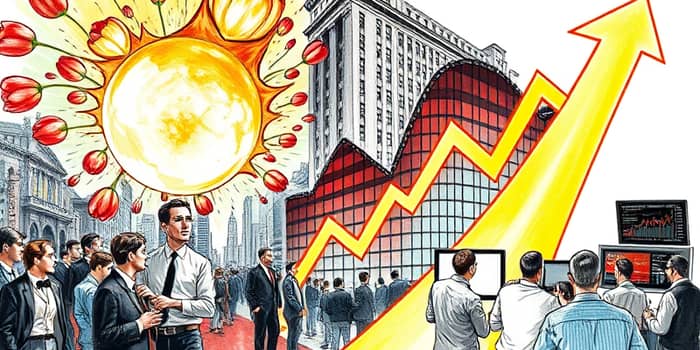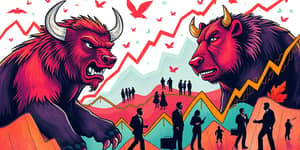Market fluctuations have shaped economic history, teaching investors timeless lessons.
By examining pivotal case studies, we can extract insights to build long-term wealth building strategies and withstand future storms.
Defining Market Fluctuations
Market fluctuations refer to rapid rises and falls in asset prices driven by investor behavior, external shocks, and policy shifts.
Understanding these swings equips individuals and institutions with tools to navigate uncertainty and capitalize on opportunities.
Tulip Mania: The First Bubble
In 17th-century Netherlands, tulip bulb prices soared to over ten times a skilled worker’s annual wage. Speculative frenzy gripped markets, fueled by irrational market exuberance.
When confidence collapsed in 1637, prices plummeted and many investors faced financial ruin. The episode illustrates the dangers of unchecked speculation and herd behavior.
The Great Depression: A Decade of Pain
The 1929 stock market crash triggered mass business failures, unemployment, and a nearly decade-long economic slump.
This era highlights the importance of diversification and robust risk management. Investors who held diversified portfolios fared significantly better than those concentrated in single sectors.
Dot-Com Bubble: Tech Hype Unleashed
During the late 1990s, optimism about internet companies drove valuations to unsustainable levels. Many profitless firms attracted enormous capital.
When the bubble burst around 2000, the NASDAQ fell nearly 78%, wiping out billions. This case underscores the peril of sector overexposure and hype without fundamental support.
2008 Global Financial Crisis
The collapse of Lehman Brothers in September 2008 sent volatility soaring. The S&P 500’s annualized volatility spiked from 20% to over 80% within months.
Major policy moves—TARP approval and the Fed’s QE1—helped stabilize markets, yet daily returns swung by ±5% around key announcements. This period exemplifies event-driven volatility spikes.
COVID-19 Crash and Swift Recovery
In March 2020, pandemic fears triggered the fastest market crash in modern history, yet equities rebounded fully within four months.
The dramatic rebound demonstrates that while downturns can be severe, rapid recovery momentum is possible when coordinated policy and innovation drive confidence.
Key Data and Recovery Patterns
Lessons From Market Cycles
Every market cycle carries unique triggers—be it speculation, policy shifts, or external shocks.
Yet common threads emerge: disciplined strategies and horizon-focused investing often outperform panic-driven decisions.
- Stay invested through downturns for better long-term returns.
- Build diversified portfolios across asset classes.
- Maintain liquidity buffers to seize opportunity.
Strategies for Risk Management
Recognizing that volatility clusters around major events, investors can incorporate dynamic risk management models to adjust exposures proactively.
Techniques include rolling-window GARCH modeling, jump-diffusion frameworks, and integrating event-window analyses into risk assessments.
- Use stop-loss orders aligned with personal risk tolerance.
- Allocate to uncorrelated assets to reduce drawdowns.
- Regularly rebalance portfolios to target weights.
Concluding Insights
From tulips to tech stocks to pandemic swings, markets have always oscillated. While uncertainty is inevitable, knowledge empowers better decisions.
By studying historic fluctuations, applying discipline, and employing robust risk tools, investors can weather storms and capture gains when markets recover.
Embrace the lessons of the past to build resilient portfolios poised for growth in any environment.
References
- https://www.numberanalytics.com/blog/case-studies-volatility-clustering-markets
- https://fastercapital.com/topics/historical-examples-of-market-fluctuations.html/1
- https://content-whale.com/us/blog/unimaginable-bounce-back-brand-case-study/
- https://mariopeshev.com/business-failure-lessons/
- https://www.youtube.com/watch?v=bngDRGYPkP8
- https://www.sba.gov/business-guide/plan-your-business/market-research-competitive-analysis
- https://www.morningstar.com/economy/what-weve-learned-150-years-stock-market-crashes










